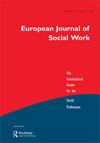社会关怀和社会工作的起源:创造全球未来
IF 1.6
3区 社会学
Q2 SOCIAL WORK
引用次数: 2
摘要
马克·亨里克森是一名圣公会牧师,后来从事社会工作,现在是新西兰的教授。他写了一篇关于道德和宗教信仰以及现代专业社会工作的教义的详细记述。他认为它起源于西欧,本书的大部分内容都致力于探索它所经历的阶段。他宣称的目的是让读者相信,现代专业社会工作起源于西欧。这几乎不需要争论,但Henrickson在识别社会工作的智力根源,也许还有精神根源方面做得很彻底。作者显然保留了他最初对神学的兴趣。正如人们所料,他精通古典和宗教资料,对基督教前期和早期的讨论异常详细。引言之后,共分七章论述西方社会工作史。其中包括:本文章由计算机程序翻译,如有差异,请以英文原文为准。
The origins of social care and social work: creating a global future
Mark Henrickson was an Anglican clergyman who turned to social work, and is now a professor in New Zealand. He has written a detailed account of the moral and religious beliefs and teachings in which modern professional social work has its roots. He argues that it is of Western European origin, and the greater part of this book is devoted to an exploration of the stages it has gone through. His stated aim is to convince the reader that modern, professional social work has its origins in Western Europe. This hardly needs arguing, but Henrickson does a thorough job of identifying the intellectual, and perhaps spiritual roots of social work. The author has clearly retained his original interest in theology. As one might expect, he is wellversed in classical and religious sources, and the discussion is unusually detailed about the preand early-Christian periods. After the Introduction, seven chapters are devoted to the history of western social work. These include:
求助全文
通过发布文献求助,成功后即可免费获取论文全文。
去求助
来源期刊

European Journal of Social Work
SOCIAL WORK-
CiteScore
3.50
自引率
20.00%
发文量
96
期刊介绍:
The European Journal of Social Work provides a forum for the social professions in all parts of Europe and beyond. It analyses and promotes European and international developments in social work, social policy, social service institutions, and strategies for social change by publishing refereed papers on contemporary key issues. Contributions include theoretical debates, empirical studies, research notes, country perspectives, and reviews. It maintains an interdisciplinary perspective which recognises positively the diversity of cultural and conceptual traditions in which the social professions of Europe are grounded. In particular it examines emerging European paradigms in methodology and comparative analysis.
 求助内容:
求助内容: 应助结果提醒方式:
应助结果提醒方式:


